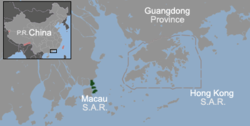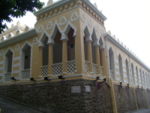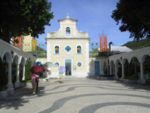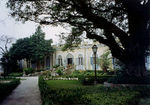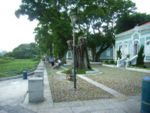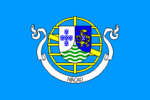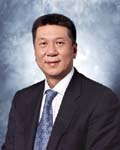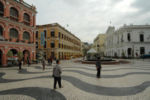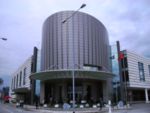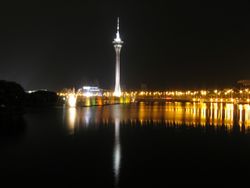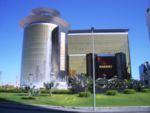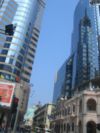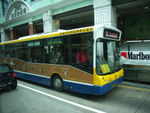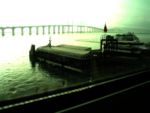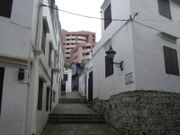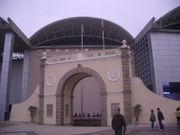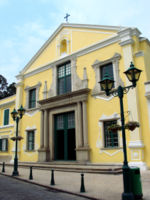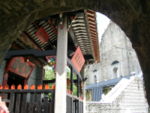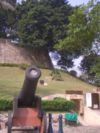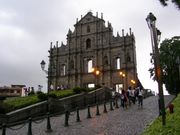Macau
2007 Schools Wikipedia Selection. Related subjects: Geography of Asia
| 中華人民共和國澳門特別行政區 Região Administrativa Especial de Macau da República Popular da China Macau Special Administrative Region of the People's Republic of China |
|||||
|
|||||
| Motto: none | |||||
| Anthem: March of the Volunteers (national anthem of the PRC) |
|||||
| Capital | none 1 |
||||
|---|---|---|---|---|---|
| Most populated freguesia | Freguesia de Nossa Senhora de Fátima | ||||
| Official languages | Cantonese ( de facto) Portuguese Mandarin ( de jure) |
||||
| Government | |||||
| - Chief Executive | Edmund Ho Hau-wah | ||||
| Establishment | |||||
| - occupied by Portugal | 1557 | ||||
| - Portuguese colony | August 13, 1862 | ||||
| - SAR of the PRC | December 20, 1999 | ||||
| Area | |||||
| - Total | 28.2 km² ( not ranked) 10.9 sq mi |
||||
| - Water (%) | 0 | ||||
| Population | |||||
| - 2006 (2nd qtr) estimate | 503,000 ( 168th) | ||||
| - 2000 census | 431,000 | ||||
| - Density | 17,310/km² ( 2nd) 44,784/sq mi |
||||
| GDP ( PPP) | 2005 estimate | ||||
| - Total | $11.5 billion ( 139th) | ||||
| - Per capita | $24,3002 ( 2005) | ||||
| HDI (2003) | 0.9092 (high) ( n/a) | ||||
| Currency | Macanese pataca ( MOP) |
||||
| Time zone | MST ( UTC+8) | ||||
| - Summer ( DST) | not observed | ||||
| Internet TLD | .mo | ||||
| Calling code | +853 |
||||
| 1 Historically, the capital was "Cidade do Nome de Deus de Macau" (or Macau Peninsula; this name abolished upon reunification). The government headquarters were located in the St. Lawrence Parish. 2 Information obtained from the Direcção dos Serviços de Estatística e Censos (Statistics and Census of the Government of Macau Special Administrative Region) |
|||||
The Macau Special Administrative Region of the People's Republic of China ( Traditional Chinese: 中華人民共和國澳門特別行政區 [ in Mandarin , in Cantonese ] ; Portuguese: Região Administrativa Especial de Macau da República Popular da China [ in Portuguese ], abbreviated as RAEM), commonly known as Macau or Macao ( Traditional Chinese: 澳門, or informally known as 馬交) is a small territory on the southern coast of the People's Republic of China. Administered by Portugal until 1999, it was the oldest European colony in China, dating back to the 16th century. The administrative power over Macau was transferred to the People's Republic of China (PRC) in 1999, and it is now one of two special administrative regions of the PRC, together with Hong Kong.
Besides historical Chinese and Portuguese world-heritage relics, Macau's biggest attraction is its gambling industry and casinos. Though many forms of gambling are legal here, the most popular game is baccarat, which generates over two thirds of the gaming industry's gross receipts.
Macao v. Macau
The name "Macau" (Portuguese pronunciation IPA: [mɐ.'kaw]) is thought to be derived from the Templo de A-Má (Temple of A-Ma or Ma Kok Temple) (媽閣廟, Cantonese Jyutping: Maa1 Gok3 Miu6, local pronunciation: Maa5 Gok3 Miu6 or Maa5 Gok3 Miu5), a still-existing landmark built in 1448 dedicated to the goddess Matsu.
The Chinese name Aomen 澳門 ( pinyin: Àomén, Cantonese Jyutping: Ou3 Mun4) means "Inlet Gates". The "gates" refer to two erect gate-like mountains of Nantai (Chinese: 南台; pinyin: Nántái) and Beitai (Chinese: 北台; pinyin: Běitái). Alternately, Ao may derive from Macau's previous name Heong San Ou, as it is geographically situated at "Cross' Door". Macau is also known as Hou Keng Ou (壕鏡澳 Oyster-mirror Inlet), Heong San Ou (香山澳 Xiangshan-ao; Fragrant-mountain Inlet), Lin Tou (蓮島 Liandao; Lotus Island), as well as Soda Port (疏打埠).
History
Sixteenth to eighteenth centuries
Chinese fishermen have been living and working in the Pearl River Delta for over four thousand years. The small peninsula and islands that came to be called Macau were first settled by the Portuguese in the sixteenth century. Prior to that, they belonged to various counties within the Chinese Empire, with the village of Mong Ha (Wangxia), located on the Macau peninsula, having been settled during the Yuan Dynasty.
In 1535, the Portuguese obtained the right to anchor ships in Macau harbours and carry out trading activities. In 1553, the Portuguese were enabled to go ashore and establish a settlement, in order to dry out goods drenched by sea water, as a reward for defeating pirates and to serve as middlemen for trade with Japan and India.
In 1557, the Portuguese established a permanent settlement in Macau, and beginning in 1670, Portugal leased the territory, although there was no transfer of sovereignty. Macau prospered as a port and was the subject of repeated attempts by the Dutch to conquer it in the 17th century.
Nineteenth century
Following the Opium War (1839-42), Portugal occupied Taipa and Coloane in 1851 and 1864 respectively. In 1887, Portugal and the Qing government signed the Sino-Portuguese Draft Minutes and the Beijing Treaty, in which China ceded to Portugal the right to "perpetual occupation and government of Macau"; conversely, Portugal pledged to seek China's approval before transferring Macau to another country.
Before the 1960s
In 1928, the Kuomintang government and the Portuguese government concluded the "Sino-Portuguese Friendship and Trade Treaty". Making only a few provisions concerning tariff principles and matters relating to business affairs, the treaty failed to mention the question with regard to Macau's position. Consequently, the situation of Portuguese occupation and government of Macau remained unchanged. In 1938 Portuguese troops occupied the Hengqin Island which had already been settled by Portuguese missionaries. Hengqin were taken by the Japanese in 1941 and reverted to China in the end of World War II.
After the 1960s
In 1966 residents tried to obtain a licence for a private school in Taipa, the first of two islands connected to and forming part of Macau. After being rejected many times they went ahead and started building without permits. On November 15, 1966, Portuguese police arrested the school officials and beat construction workers, residents, and press reporters. As a result, Chinese teachers and students gathered at the Governor’s Palace to protest; some even got inside the Palace to cite the quotations of Mao Zedong and sang Chinese revolutionary songs. On December 3 the government ordered them to be arrested. This stirred up the anger of the general public and more people came to protest. They pulled down the statue of Colonel Vicente Nicolau de Mesquita at Largo do Senado at the city centre, and burned archive documents - some irreplaceable - at the Leal Senado Building and the Holy House of Mercy. Portuguese soldiers from Africa, who came to Macau on holiday, were called in and martial law was declared. As a result of the protests, 11 people were killed by police and 200 were injured. The incident is often referred to as "12-3," with reference to the date of the riots.
The Chinese people adopted a "three no's" approach as a means to continue their struggle with the Government — no taxes, no service, no selling to the Portuguese. They were successful and on January 29, 1967 the Portuguese government of Macau signed a statement of apology. This marked the beginning of equal treatment and recognition of Chinese identity and of de facto Chinese control of the colony, as an official apology underlined the fact that after 1949, administration of Macau continued only at the behest of the Mainland Communist government.
After the leftist military coup of 1974, the now democratic Portuguese government was determined to relinquish all its overseas possessions, but the People's Republic of China did not favour Macau's immediate return to Chinese sovereignty and asked Portugal to continue to administer it. In 1976, Lisbon redefined Macau as a "territory under Portuguese administration," and granted it a large measure of administrative, financial and economic autonomy. The Chinese Government stated on many occasions that Macau has always been Chinese territory and the issue left by history should be settled through negotiations when conditions were ripe.
Transitional period, handover
Portugal and the People's Republic of China agreed in 1979 to regard Macau as "a Chinese territory under (temporary) Portuguese administration". Negotiations between the Chinese and Portuguese governments on the question of Macau started in June 1986. In 1987, an international treaty, known as the Sino-Portuguese Joint Declaration, was signed to make Macau a Special Administrative Region of the PRC.
The Chinese government assumed sovereignty over Macau on December 20, 1999, ending 329 years of Portuguese rule.
Legal system and judiciary
In order to implement the principle of high degree of autonomy, the basic and original framework of the legal system of Macau must also be preserved for at least 50 years after 20 December 1999 according to the provision made by the Sino-Portuguese Joint Declaration on the Question of Macau.
The legal system is based largely on Portuguese law or Portuguese civil law system. The territory has its own independent judicial system, with a high court. Judges are selected by a committee and appointed by the chief executive. Foreign judges may serve on the courts. In July 1999 the chief executive appointed a seven-person committee to select judges for the SAR. 24 judges were recommended by the committee and were then appointed by Mr. Ho.
Macau has three courts: the Court of the First Instance, the Court of the Second Instance, and the Court of Final Appeal, Macau's highest court. Sam Hou Fai is the President (Chief Justice) of the Court of Final Appeal.
No death penalty or life imprisonment is currently imposed in Macau SAR due to the prohibition by the Penal Code of Macao (Article 39). Ampliate reformations in legal system in Macau can be seen after handover. The prominent example is using Chinese language in courts, in addition to the process of legislation.
Government and politics
Introduction
The status of Macau since reverting to People's Republic of China sovereignty on 20th December 1999 is defined in the Sino-Portuguese Joint Declaration and the Basic Law, Macau's constitution promulgated by China's National People's Congress in 1993. The Joint Declaration and the Basic Law specify that Macau's social and economic system, lifestyle, rights, and freedoms are to remain unchanged for at least 50 years.
Under the principle of "one country, two systems" articulated in the Basic Law of Macau, Macau enjoys a high degree of autonomy except in defense and foreign affairs. Macau officials, rather than PRC officials, run Macau through the exercise of separate executive, legislative, and judicial powers. Macau maintains its own separate currency, customs territory, immigration and border controls, and police force.
Chief executive
The chief executive is appointed by the People's Republic of China's central government. Election of the Chief Executive after election by an election committee, whose members are nominated by corporate and community bodies. The chief executive's cabinet comprise five policy secretaries. He is advised by an Executive Council that has between 7 and 11 members. Edmund Ho Hau Wah, a community leader and former banker, is the first China-appointed chief executive of the Macau SAR, having replaced General Vasco Rocha Vieira at midnight on December 19, 1999.
Legislative body
The legislative organ of the territory is the Legislative Assembly, a 29-member body comprising 12 directly elected members, 10 appointed members representing functional constituencies and seven members appointed by the chief executive. The Legislative Assembly is responsible for lawmaking and like many other legislatures, it has power to impeach the Chief Executive. It has power to amend the method of electing the chief executive after 2009. The democratic infrastructure of Macau SAR remains powerless. The ability of the legislature to initiate legislation is limited, although it plays a role in shaping legislation. There is little public pressure for democratization.
Political associations
Political associations in the Legislative Council of Macau are mainly including: New Democratic Macau Association, United Citizens Association of Macau, Union for Development, Union for Promoting Progress, Alliance for the Development of Macau, New Hope, General Union for the Good of Macau, Convergence for Development.
Elections
The general requirements of suffrage for direct election in Macau is an adult at or over 18 years of age and he or she must be a permanent resident in that region. For indirect election, it is only limited to organizations registered as "corporate voters and a 300-member Election Committee drawn from broad regional groupings, municipal organizations, and central governmental bodies.
Administrative divisions
Macau was formerly divided into two municipalities and seven parishes. Each municipality was run by a municipal council (câmara municipal), with a supervising municipal assembly (assembleia municipal).
When it became a SAR, the municipalities were abolished and the parishes were voided of administrative functions. In their place is a new administrative body, the Civic and Municipal Affairs Bureau (Portuguese: Instituto para os Assuntos Cívicos e Municipais), under the Secretariat for Administration and Justice (Secretaria da Administração e Justiça) of the SAR government. The parishes are still officially recognized but only on a symbolic basis.
Geography
Terrain
Macau is 70 kilometres (43 mi) southwest of Hong Kong and 145 kilometres (90 mi) from Guangzhou. It consists of a peninsula, and the islands of Taipa and Coloane. The peninsula is formed by the Zhujiang (Pearl River) estuary on the east and the Xijiang (West River) on the west. It borders the Zhuhai Special Economic Zone in mainland China. Macau has a generally flat terrain resulting from extensive land reclamation, but numerous steep hills mark the original natural land mass. The Macau peninsula was originally an island, but gradually a connecting sandbar turned into a narrow isthmus. Land reclamation in the 17th century made Macau into a peninsula. With a dense urban environment, Macau has no arable land, pastures, forest, or woodland. Because of this deficiency, Macau's people traditionally have looked to the sea for their livelihood.
Climate
Macau is located on the northern fringe of the sub-tropical zone. Seasonal climate is greatly influenced by the monsoon. The average annual temperature of Macau is 22.3 °C. July is the hottest month, with average monthly temperature being 28.6 °C (mostly above 30 °C in reality). The coldest month is January, whose average monthly temperature is 14.5 °C. Located in the coastal region of south the People's Republic of China, Macau has ample rainfall, with average annual precipitation being 2,030 millimeters.
Economy
Macau's economy is based largely on tourism, namely gambling.
Other chief economic activities are export-geared textile and garment manufacturing, banking and other financial services. The clothing industry has provided about three-fourths of export earnings, and the gaming, tourism and hospitality industry is estimated to contribute more than 50% of Macau's GDP, and 70% of Macau government revenue.
From 9.1 million in 2000, arrivals to Macau has grown to 18.7 million in 2005, with over 50% of the arrivals coming from mainland China. This recent growth has been driven by gambling and related tourism. Tourists from Hong Kong remain numerous, representing about 30% of arrivals. Since the 1999 return to Chinese rule, Triad underworld violence, a dark spot on the economy, has virtually disappeared, to the benefit of the tourism sector.
The average growth rate between 2001 and 2005 has been approximately 10% annually. The GDP per capita in 2005 was USD $24,300. In the second quarter of 2006, the unemployment rate stood at 3.8%.
Gambling
With the opening of the Sands Macau, the largest casino in the world as measured by total number of table games, in 2004 and Wynn Macau in 2006, gambling revenues from Macau's casinos were for the first time greater than those of Las Vegas (each about $6 billion), making Macau one of the highest-volume gambling centres in the world. Other casinos and hotels slated to be opened through 2009 are: The Venetian Macao (2007), Four Seasons (2007), MGM Grand Macau (2007), Ponte 16 (2007), Macau Dorsett Hotel Complex (2007), Grand Hyatt (2007), Galaxy Cotai Megaresort (2008), City of Dreams (2008), Oceanus (2008), Mandarin Oriental (2009). First Phase of Macao's Cotai Strip scheduled to open in 2007 includes 7 resort hotels comprising of 10,000 guest rooms. The $1.8 billion Venetian Macao will serve as the anchor. As a result, Macau's economy is growing rapidly due to gambling related tourism and construction from the new casino entrants.
Offshore banking
Amongst Bermuda, British Virgin Islands or Bahamas, Macau is one of the most well-known offshore financial centres and tax havens in a worldwide sense. Banco Nacional Ultramarino , Banco Delta Asia , Seng Heng Bank or Tai Fung Bank are among the most influential banks in Macau, to name a few.
There are also many foreign banks registered and established in Macau as well, e.g. Bank of America - Macau , HSBC - Macau, etc. Macau is a free port and no policy of monetary control is imposed. To operate offshore service business is entirely feasible in Macau as related offshore law has been in effect since 1999. The offshore finance business is regulated and supervised by the Monetary Authority of Macao, while the regulation and supervision of the offshore non-finance business is mainly controlled by the Macau Trade and Investment Promotion Institute.
Investment
Foreign investors from overseas who want to obtain the status of permanent residence in Macau should purchase fixed assets with a value no less than 1 million Patacas. Besides, no less than an additional half million Patacas should be deposited in certain appointed credit institutions in Macau before getting the landing papers. This governmental policy has successfully attracted an influx of billions of Pataca and foreign capital that create a positive effect in the Macau SAR's economy, especially in the sphere of real estate.
Transportation
In Macau visitors will find an efficient bus service, not only in the city but also on the islands. Visitors can look for the destinations, itineraries and stops in the information panels located at every bus stop. All the buses have air conditioning. Between Macau and Taipa visitors can catch buses 11, 22, 28A, 30, 33, 34 and also the airport bus AP1. Buses 21, 21A, 25, 26, and 26A connect Macau, Taipa and Coloane. There are other buses circulating around the Macau peninsula.
There are plenty of taxis, the flagfall charge is MOP$12.00. There is no surcharge between Macau and Taipa island, but between Taipa and Coloane, a MOP$2.00 surcharge applies. Between Macau and Coloane there is a MOP$5.00 surcharge. Moreover there is a MOP$3.00 surcharge for each piece of luggage carried in the boot. In order to eliminate the language barrier between taxi drivers and passengers, the Tourist Office has provided most taxis with a destination guide which includes the names of the most requested destinations in Chinese, Portuguese and English. When used together with a map, this guide will reduce many of the usual misunderstandings.
In the past, the Macau Maritime Museum used to arrange two sailing vessels in which they were re-modelled into a new shape from the ancient one, touring the inner and outer harbours. Along the trip, the general lifestyle and custom of boat dwellers was introduced. Food and drink were occasionally provided in that trip. However, due to the land reclamation works in the harbour and the boat maintenance, all junk trips have been temporarily suspended. The exhibition building and the open-air café esplanade of the Maritime Museum are open as usual (closed on Tuesdays).
The trishaw is immemorial and the speed of ride is pretty slow. Nowadays jinrikisha has not served as the tool of mass transit in Macau anymore. However, it is a good idea to use the jinrikisha to roam in particular area of Nanwan or other interesting places. There is no standard fee for such kind of service and thus one may need to negotiate first with the tricycle owner.
Anyone who wishes to hire a car will need to be at least twenty-one years old, have an I.D. or passport, a valid driver's licence (or, for some countries, an international driving licence) and a credit card for deposit.
Demographics
Considered as a special administrative region or dependency, Macau is one of the most densely populated regions in the world.
Macau's population is 95% Chinese, primarily Cantonese, Fujianese as well as some Hakka, Shanghainese and overseas Chinese immigrants from Southeast Asia and elsewhere. The remainder are of Portuguese or mixed Chinese-Portuguese ancestry, the so-called Macanese, as well as several thousand Filipino and Thai nationals.
The official languages are Portuguese and Chinese.
Residents of Macau mostly speak Cantonese natively; Portuguese, Mandarin, English, Fujianese, Filipino, Thai, and several other languages are also spoken. The Macanese language, which is generally known as Patuá, is a distinctive Creole that is still spoken by several dozen Macanese, an ethnic group of mixed Asian and Portuguese ancestry that accounts for about two per cent of Macau's population. (However, Macanese is sometimes also used in the broader sense to describe any permanent resident of Macau.)
Work force in Macau SAR is mainly composed of manufacturing 16.4%; construction 8.3%; wholesale and retail trade, repair, hotels and restaurants 27.1%; financial services, real estate, and other business activities 8.6%; public administration, other communities, social and personal services, including gaming 31.8%; transport, storage and communications 6.8%.
According to the recent survey conducted by the U.S. Central Intelligence Agency (CIA), Macau has always been one of the longest life expectancy at birth in the world. The birth rate, the total fertility rate and the infant mortality rate as well are one of the lowest in the world.
The growth of population in Macau is mainly relying on Chinese immigrants from mainland China and the influx of overseas workers. With over 503,000 people (2006 second quarter estimate) living in that region, Macau is now classified and upgraded as a large city.
The nationality of people with Chinese descent living in Macau and/or those who are qualified to apply for MSAR passport are considered as Chinese. Although dual nationality is not recognized by the government of Macau SAR, foreign passports (including Portuguese passports) can be freely used as travel documentation without restrictions, regardless of one's nationality.
Religion and culture
According to recent census figures, of the more than 355,000 persons surveyed, 60.9 percent had no religious affiliation, 16.8 percent were Buddhist, 13.9 percent were "other" (followers of a combination of Buddhist, Taoist, and Confucian beliefs), 6.7 percent were Roman Catholic, and 1.7 percent were Protestant. The number of active Falun Gong practitioners declined from approximately 100 persons to approximately 20 after the movement was banned in mainland China in July 1999. There are about 100 Muslims in Macau.
Most Macau people believe in the Chinese Folk religion, which includes the faiths of Confucianism, Taoism, Buddhism and the folk gods and goddesses (especially Kuan Yin and Matsu), like other Chinese communities. There are between forty and fifty temples of various sizes in Macau, mostly built a century or so ago, although some date back five-hundred years. In certain occasions one can find out that Kuan Yin or the images of Buddha and other gods or xoanons from the sphere of Taoism might be appeared at the same temple. The most famous ones are the Puji Temple, the A-Ma Temple and, in particular, the Lotus Temple. Built in 1592, the Lotus Temple has a history of over four hundred years. The Catholic Diocese of Macau was established on 23rd January, 1576. The first bishop of the Catholic Diocese of Macau was D. Belchior Carneiro. The first Chinese bishop was Domingos Lam. The present bishop is D. José Lai, who is the first native-born Chinese bishop in Macau. About five per cent of Macau's population is Catholic.
The Catholic Church in Macau recognizes the Pope as the head of the Church. A new Coadjutor Bishop for the Macau diocese was appointed by Vatican or Holy See in June, 2003.
Macau was also the first station of the Protestant church for mission in China.
Landmarks
- Casino Lisboa
- Fortaleza do Monte
- Guia Fortress
- Macau Fisherman's Wharf
- Macau Tower
- Old Protestant Cemetery
- Ruins of Saint Paul's Cathedral
The Historic Centre of Macau, which includes some twenty-eight historic monuments and eight public squares, was listed as a World Heritage Site by UNESCO on 15 July 2005.
Macau-related topics
|
|
|
|


